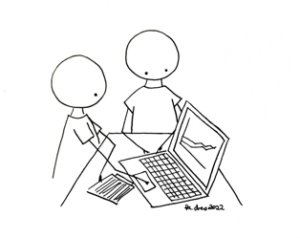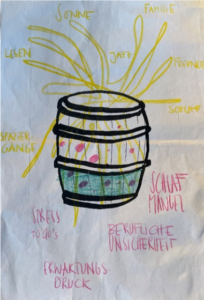What exactly is resilience and how can it help students in their everyday life? In this article you can find tips and tricks to better deal with demanding situations and stress in your student life.
“I still remember how I felt after failing an exam for the third time. I was so frustrated, because I only had one attempt left to pass the oral exam. This drove me into a bit of a crisis, because presentations and oral exams make me very nervous.”
Resilience – what is that?
There are phases and situations during the course of your degree programme that can be demanding or overwhelming. Often it is not only the exams or assignments that are perceived as stressful, but also everything else that everyday life entails. The ability to easily overcome (unexpected) challenges, to achieve (mental) equilibrium soon after and, ideally, learn from them is called resilience. Resilience does not mean that you avoid setbacks or failures or that you never feel insecure. It means recovering from stress and strain as well as possible, while being able to trust your own strengths.
It is therefore a psychological resilience or inner strength that every person can train and strengthen.
“Back then I got a lot of support from a friend. She listened to me when I was feeling insecure and helped me with rehearsing my presentation and gave me feedback. This way, I was able to better get used to speaking in front of people and became less afraid of judgement. That really helped me.”
Why is resilience important in your studies?
Resilience plays an important role in your studies as it can help you cope with stressful learning periods in a positive and productive way.
It is about giving you the feeling that you are well prepared and that you can rely on yourself. It can help you with successfully learning new things. In turn, this can have a positive impact on your study progress. Resilience in your studies also means developing a good sense of yourself and your needs in order to feel good and achieve your goals.
How do I become (more) resilient?
Resilience is a process and it pays to be patient. You can support this process by observing and reflecting on your situations of success and failure and reflecting on which thoughts cause bad feelings and which behaviours can be beneficial.
If you have a lot of tasks to do at once, various resources, such as study plans with sufficient breaks, enough sleep or conversations with friends or fellow students can be a great support for you. Such resources can give you the feeling that problems in your studies are solvable.
Realise that you have already mastered difficult situations several times before. For example, if you are preparing for an exam or have to give a presentation, remember that you have been in exam situations or given presentations several times before. So there are aspects of the situation that you know and have experience with. Think about the skills you have used for this and how they can also be useful for the next challenge.
Work on these areas if you want to further increase your resilience:
Mindset:
- Focus on your own strengths and goals. This works best when you subdivide big goals into smaller sub-goals and approach them step by step.
- This does not mean that everything has to be always perfect: Reflect on your needs and adjust your expectations to the situation, the available opportunities and your energy resources.
- Keep an open mind and do not be afraid of trying new things and also learn from mistakes – take responsibility for your own actions.
Self-care and social life:
- Take regular breaks. Breaks ensure that you can recover and get new energy and ideas.
- Shared activities with friends and mutual support also have a relieving effect in difficult times.
- Make time for your hobbies even during stressful periods – these can provide a good balance (e.g. USI courses offer a wide range of sports programmes and the opportunity to meet new people).
- Exchange ideas with fellow students, meet up to prepare for presentations or study together. This can be motivating and can give you confidence in dealing with the subject matter or other requirements.
Organisation and time management:
- Get an overview of the different tasks and your weekly planning.
- Make sure that the goals you set match your resources. It is normal that you cannot perform at exactly the same level every day. Adjust your expectations and to-dos to your energy level and set new priorities if necessary.
- Be realistic with your time planning and schedule enough buffers. This can help you with not drifting off into being overwhelmed.
The University of Vienna cares:
- Tutors support you during courses – you can turn to them if you have any questions.
- If you need professional counselling in case of prolonged stress, you can turn to the Psychological Counselling Services.
- On the blog of the University of Vienna you can find more input on various topics (e.g. time management, digital studying, student multipliers, etc.).
- The Center for Teaching and Learning offers useful tips and support.
“For me, my biggest success was that I did not give up and tried different things that could help me. I now feel better prepared for the coming challenges.”
Every person feels comfortable with different strategies, so try them out and find the one that suits you. You may also notice that you are already using many resources – for example, group sharing on a messenger service can also be a resource.
One more small exercise to finish:
Energy barrel
On a piece of paper, draw a barrel that represents your energy supply. What percentage of your barrel is filled? (This can be today’s’ energy level or the mean value of the past week.) The holes in the barrel are tasks and situations that steal your energy. Above, list the tasks and situations that provide you with energy. Think about what you need to permanently strengthen your energy balance in the long term and how you can implement your resolutions. Are there energy wasters that can be easily reduced?
It is not about filling up the barrel to 100 % and to get rid of all energy wasters. Rather, it is about taking time to become aware of your own situation. Sometimes it can help to simply name the different factors. If you want to change something, it is advisable to take small steps and note progress. It may already be relieving to take enough time for a coffee or tea in the morning before a busy day.
It is also interesting if you have already drawn some energy barrels and can look at the differences.







